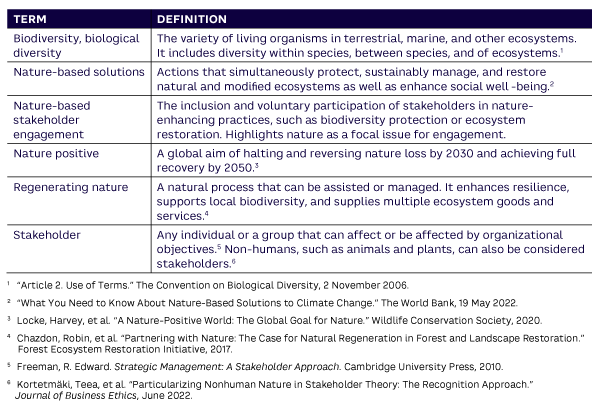The business sector, in collaboration with various stakeholders, is instrumental in providing resources and solutions to address the biodiversity crisis. Biodiversity is declining at an alarming rate, and the costs of inaction — compromised organizational legitimacy and reputation, raw-material shortages, and intensified ecological crises — are increasing. The global community has called for immediate widespread action to “bend the curve” of biodiversity decline.
There is increasing evidence of global biodiversity decline. This is alarming given that, according to the World Economic Forum, more than half of global GDP is highly or moderately dependent on ecosystem services, and businesses are more dependent on nature than was previously thought.
Businesses control substantial resources and knowledge that can, and must, be harnessed for biodiversity action. Business’s response to biodiversity decline has the power to accelerate activities across our societies or, through inaction, hamper societal responses.
There is strong evidence of positive movement, including societal transitions and frameworks that enable harmony with nature. Businesses are now involved with numerous multi-stakeholder networks that aim to develop solutions to thorny sustainability issues, and nature positive language is becoming more commonplace in business. Focusing on what’s possible and amplifying positive steps are of utmost importance to implementing change on a short timescale.
We suggest that new phrases are needed to catalyze biodiversity action. The term “nature-based stakeholder engagement” is discussed in this article as a potential candidate, as it connects two powerful notions. “Nature-based solutions” include actions that both protect natural ecosystems and enhance social well-being. “Stakeholder engagement” refers to the inclusion of stakeholders in organizational practices. Thus, nature-based stakeholder engagement highlights nature as a focal issue for engagement and the need to include a wide variety of stakeholders in nature-enhancing practices like biodiversity protection.
New Phrase Promotes Key Connections
Recent sustainability research shows that certain types of language, fresh vocabulary, and attractive metaphors are extremely helpful in initiating and boosting collaborative action for sustainability transformation. (Note that we’re using the term “metaphor” in the Aristotelian sense: a perception of the similarity in the dissimilar.)
It’s time to look closely at the role of language in creating vocabulary with sufficient weight and practical relevance to catalyze biodiversity action in business-stakeholder networks.
We believe the term “nature-based stakeholder engagement” has the potential to establish a connection between regenerating nature, nature-based solutions, and the business sector and to initiate biodiversity action in business-stakeholder networks.
We argue that this phrase is impactful and meaningful because it derives from terms that are part of different discourses: stakeholder engagement and nature-based solutions. Stakeholder engagement is an established construct in management and strategy, as well as in environmental management research and practice. The phrase “nature-based solutions” is widely used in environmental practice and policy making.
Thus, the concept of nature-based stakeholder engagement transfers “nature” into the domain of business management and stakeholder collaboration and gains power through the interaction and the entangled association of two established discourses. This type of vocabulary has the potential to create a bridge between academic and practitioner communities.

[For more from the authors on this topic, see: “Language Is Key to Catalyzing Biodiversity Action in Business.”]





